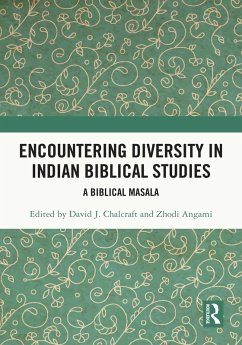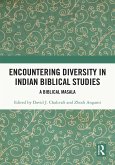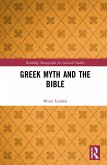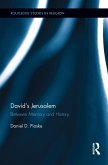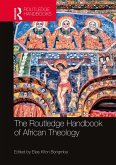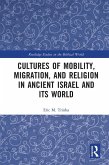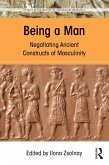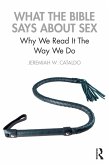Encountering Diversity in Indian Biblical Studies (eBook, PDF)
A Biblical Masala
Redaktion: Chalcraft, David J.; Angami, Zhodi
42,95 €
42,95 €
inkl. MwSt.
Sofort per Download lieferbar

21 °P sammeln
42,95 €
Als Download kaufen

42,95 €
inkl. MwSt.
Sofort per Download lieferbar

21 °P sammeln
Jetzt verschenken
Alle Infos zum eBook verschenken
42,95 €
inkl. MwSt.
Sofort per Download lieferbar
Alle Infos zum eBook verschenken

21 °P sammeln
Encountering Diversity in Indian Biblical Studies (eBook, PDF)
A Biblical Masala
Redaktion: Chalcraft, David J.; Angami, Zhodi
- Format: PDF
- Merkliste
- Auf die Merkliste
- Bewerten Bewerten
- Teilen
- Produkt teilen
- Produkterinnerung
- Produkterinnerung

Bitte loggen Sie sich zunächst in Ihr Kundenkonto ein oder registrieren Sie sich bei
bücher.de, um das eBook-Abo tolino select nutzen zu können.
Hier können Sie sich einloggen
Hier können Sie sich einloggen
Sie sind bereits eingeloggt. Klicken Sie auf 2. tolino select Abo, um fortzufahren.

Bitte loggen Sie sich zunächst in Ihr Kundenkonto ein oder registrieren Sie sich bei bücher.de, um das eBook-Abo tolino select nutzen zu können.
This book provides analysis of biblical narratives and texts which are the vehicle for the expression, articulation and performance of diverse identities in the Indian context. It is suitable for students, scholars, and researchers working on postcolonial biblical studies and diversity in Christianity.
- Geräte: PC
- ohne Kopierschutz
- eBook Hilfe
- Größe: 8.73MB
Andere Kunden interessierten sich auch für
![Encountering Diversity in Indian Biblical Studies (eBook, ePUB) Encountering Diversity in Indian Biblical Studies (eBook, ePUB)]() Encountering Diversity in Indian Biblical Studies (eBook, ePUB)42,95 €
Encountering Diversity in Indian Biblical Studies (eBook, ePUB)42,95 €![Greek Myth and the Bible (eBook, PDF) Greek Myth and the Bible (eBook, PDF)]() Bruce LoudenGreek Myth and the Bible (eBook, PDF)42,95 €
Bruce LoudenGreek Myth and the Bible (eBook, PDF)42,95 €![David's Jerusalem (eBook, PDF) David's Jerusalem (eBook, PDF)]() Daniel PioskeDavid's Jerusalem (eBook, PDF)50,95 €
Daniel PioskeDavid's Jerusalem (eBook, PDF)50,95 €![The Routledge Handbook of African Theology (eBook, PDF) The Routledge Handbook of African Theology (eBook, PDF)]() The Routledge Handbook of African Theology (eBook, PDF)46,95 €
The Routledge Handbook of African Theology (eBook, PDF)46,95 €![Cultures of Mobility, Migration, and Religion in Ancient Israel and Its World (eBook, PDF) Cultures of Mobility, Migration, and Religion in Ancient Israel and Its World (eBook, PDF)]() Eric M. TrinkaCultures of Mobility, Migration, and Religion in Ancient Israel and Its World (eBook, PDF)40,95 €
Eric M. TrinkaCultures of Mobility, Migration, and Religion in Ancient Israel and Its World (eBook, PDF)40,95 €![Being a Man (eBook, PDF) Being a Man (eBook, PDF)]() Being a Man (eBook, PDF)46,95 €
Being a Man (eBook, PDF)46,95 €![What the Bible Says About Sex (eBook, PDF) What the Bible Says About Sex (eBook, PDF)]() Jeremiah CataldoWhat the Bible Says About Sex (eBook, PDF)39,95 €
Jeremiah CataldoWhat the Bible Says About Sex (eBook, PDF)39,95 €-
-
-
This book provides analysis of biblical narratives and texts which are the vehicle for the expression, articulation and performance of diverse identities in the Indian context. It is suitable for students, scholars, and researchers working on postcolonial biblical studies and diversity in Christianity.
Dieser Download kann aus rechtlichen Gründen nur mit Rechnungsadresse in A, B, BG, CY, CZ, D, DK, EW, E, FIN, F, GR, HR, H, IRL, I, LT, L, LR, M, NL, PL, P, R, S, SLO, SK ausgeliefert werden.
Produktdetails
- Produktdetails
- Verlag: Taylor & Francis eBooks
- Seitenzahl: 402
- Erscheinungstermin: 20. März 2023
- Englisch
- ISBN-13: 9781000835120
- Artikelnr.: 67353859
- Verlag: Taylor & Francis eBooks
- Seitenzahl: 402
- Erscheinungstermin: 20. März 2023
- Englisch
- ISBN-13: 9781000835120
- Artikelnr.: 67353859
- Herstellerkennzeichnung Die Herstellerinformationen sind derzeit nicht verfügbar.
Zhodi Angami is Professor of New Testament and Dean of Postgraduate Studies at Eastern Theological College, Jorhat, India. He earned a PhD in New Testament from the University of Divinity, Australia. His special areas of interest are Jesus, the Gospels, the history and formation of the Bible and tribal interpretation of the Bible. His publications include Tribals, Empire and God: A Tribal Reading of the Birth of Jesus in Matthew's Gospel (2017) and The Making of the Bible (2017). David J. Chalcraft is Professor of Sociology at Liverpool John Moores University, UK, and formerly Chair of Biblical Studies at the University of Sheffield (2011-2014). He has long been associated with the analysis of classical sociology and with the use of sociology in biblical studies, editing such volumes as Social Scientific Old Testament Criticism (1995), Sectarianism in Early Judaism: Sociological Advances (2007) and Theories, Methods and Imagination (with Frauke Uhlenbruch and Rebecca S Watson) (2014).
A Biblical Masala: An Orientation to Our Book, David J. Chalcraft; SECTION
I: Historical Episodes of Biblical Studies in India from a British
Perspective; 1. Strategies Past, Present and Future: The Context and
Variety of Biblical Studies in Indian Culture and Society, David J.
Chalcraft; 2. English and Indian Readings of Naboth's Vineyard: The Role of
Identity and Context in the Sociological Meaning and Use of Biblical Texts,
David J. Chalcraft; 3. Nation and Text: The Biblical Roots of Hindu
Nationalism, Hugh S. Pyper; SECTION II: Readings with a Social Conscience;
4. Holiness School's Response to Economic Injustice: Reading Leviticus 25
in the Multi-Religious and Cultural Context of India, P. Joseph Titus; 5. A
Dialogue between Indian and Biblical Social Settings: Reading the Two
Parables of Rich Men (Luke 12.16-21 and 16.19-31) Contextually, V.J. John;
SECTION III: Dalit/Madiga Hermeneutics; 6. The Context of Dalit Christians
in Rural Andhra Pradesh: Christian Faith, Caste and Culture, Jeeva Kumar
Ravela; 7. Encountering the Bible: Listening to the Voices of Madiga
Christians, Jeeva Kumar Ravela and David J. Chalcraft; 8. Why Are Times Not
Kept by the Almighty?' - Job, Violence and God: A Dalit Contextual Reading
of Job 24, Jeeva Kumar Ravela; SECTION IV: Tribal Hermeneutics; 9. An
Introduction to Tribal Interpretation of the Bible, Zhodi Angami; 10.
Reading Amos 6.1-7 in the Light of Mizo Values and Ethos, K. Lallawmzuala;
11. Seeing Jesus through Tribal Eyes, Zhodi Angami; 12. A Tribal God for a
Tribal People: Reading the Creation Narratives of Genesis and the Prologue
of John's Gospel from an Angami Perspective, Zhodi Angami; SECTION V: An
Empirical Turn? The (Visual) Ethnography of Biblical Encounter; 13. The Use
of the Bible in the Institutional Body Language of Christian Schools in
India: Mediating Western; Christian; or Western-Christian Culture in
Contemporary India?, Sally Elton-Chalcraft; 14. 'Bad Fellows' Doing a
'Cursed Job': Reading the Bible with 'Ordinary' Autowallahs in Chennai,
Arren Bennet Lawrence.
I: Historical Episodes of Biblical Studies in India from a British
Perspective; 1. Strategies Past, Present and Future: The Context and
Variety of Biblical Studies in Indian Culture and Society, David J.
Chalcraft; 2. English and Indian Readings of Naboth's Vineyard: The Role of
Identity and Context in the Sociological Meaning and Use of Biblical Texts,
David J. Chalcraft; 3. Nation and Text: The Biblical Roots of Hindu
Nationalism, Hugh S. Pyper; SECTION II: Readings with a Social Conscience;
4. Holiness School's Response to Economic Injustice: Reading Leviticus 25
in the Multi-Religious and Cultural Context of India, P. Joseph Titus; 5. A
Dialogue between Indian and Biblical Social Settings: Reading the Two
Parables of Rich Men (Luke 12.16-21 and 16.19-31) Contextually, V.J. John;
SECTION III: Dalit/Madiga Hermeneutics; 6. The Context of Dalit Christians
in Rural Andhra Pradesh: Christian Faith, Caste and Culture, Jeeva Kumar
Ravela; 7. Encountering the Bible: Listening to the Voices of Madiga
Christians, Jeeva Kumar Ravela and David J. Chalcraft; 8. Why Are Times Not
Kept by the Almighty?' - Job, Violence and God: A Dalit Contextual Reading
of Job 24, Jeeva Kumar Ravela; SECTION IV: Tribal Hermeneutics; 9. An
Introduction to Tribal Interpretation of the Bible, Zhodi Angami; 10.
Reading Amos 6.1-7 in the Light of Mizo Values and Ethos, K. Lallawmzuala;
11. Seeing Jesus through Tribal Eyes, Zhodi Angami; 12. A Tribal God for a
Tribal People: Reading the Creation Narratives of Genesis and the Prologue
of John's Gospel from an Angami Perspective, Zhodi Angami; SECTION V: An
Empirical Turn? The (Visual) Ethnography of Biblical Encounter; 13. The Use
of the Bible in the Institutional Body Language of Christian Schools in
India: Mediating Western; Christian; or Western-Christian Culture in
Contemporary India?, Sally Elton-Chalcraft; 14. 'Bad Fellows' Doing a
'Cursed Job': Reading the Bible with 'Ordinary' Autowallahs in Chennai,
Arren Bennet Lawrence.
A Biblical Masala: An Orientation to Our Book, David J. Chalcraft; SECTION
I: Historical Episodes of Biblical Studies in India from a British
Perspective; 1. Strategies Past, Present and Future: The Context and
Variety of Biblical Studies in Indian Culture and Society, David J.
Chalcraft; 2. English and Indian Readings of Naboth's Vineyard: The Role of
Identity and Context in the Sociological Meaning and Use of Biblical Texts,
David J. Chalcraft; 3. Nation and Text: The Biblical Roots of Hindu
Nationalism, Hugh S. Pyper; SECTION II: Readings with a Social Conscience;
4. Holiness School's Response to Economic Injustice: Reading Leviticus 25
in the Multi-Religious and Cultural Context of India, P. Joseph Titus; 5. A
Dialogue between Indian and Biblical Social Settings: Reading the Two
Parables of Rich Men (Luke 12.16-21 and 16.19-31) Contextually, V.J. John;
SECTION III: Dalit/Madiga Hermeneutics; 6. The Context of Dalit Christians
in Rural Andhra Pradesh: Christian Faith, Caste and Culture, Jeeva Kumar
Ravela; 7. Encountering the Bible: Listening to the Voices of Madiga
Christians, Jeeva Kumar Ravela and David J. Chalcraft; 8. Why Are Times Not
Kept by the Almighty?' - Job, Violence and God: A Dalit Contextual Reading
of Job 24, Jeeva Kumar Ravela; SECTION IV: Tribal Hermeneutics; 9. An
Introduction to Tribal Interpretation of the Bible, Zhodi Angami; 10.
Reading Amos 6.1-7 in the Light of Mizo Values and Ethos, K. Lallawmzuala;
11. Seeing Jesus through Tribal Eyes, Zhodi Angami; 12. A Tribal God for a
Tribal People: Reading the Creation Narratives of Genesis and the Prologue
of John's Gospel from an Angami Perspective, Zhodi Angami; SECTION V: An
Empirical Turn? The (Visual) Ethnography of Biblical Encounter; 13. The Use
of the Bible in the Institutional Body Language of Christian Schools in
India: Mediating Western; Christian; or Western-Christian Culture in
Contemporary India?, Sally Elton-Chalcraft; 14. 'Bad Fellows' Doing a
'Cursed Job': Reading the Bible with 'Ordinary' Autowallahs in Chennai,
Arren Bennet Lawrence.
I: Historical Episodes of Biblical Studies in India from a British
Perspective; 1. Strategies Past, Present and Future: The Context and
Variety of Biblical Studies in Indian Culture and Society, David J.
Chalcraft; 2. English and Indian Readings of Naboth's Vineyard: The Role of
Identity and Context in the Sociological Meaning and Use of Biblical Texts,
David J. Chalcraft; 3. Nation and Text: The Biblical Roots of Hindu
Nationalism, Hugh S. Pyper; SECTION II: Readings with a Social Conscience;
4. Holiness School's Response to Economic Injustice: Reading Leviticus 25
in the Multi-Religious and Cultural Context of India, P. Joseph Titus; 5. A
Dialogue between Indian and Biblical Social Settings: Reading the Two
Parables of Rich Men (Luke 12.16-21 and 16.19-31) Contextually, V.J. John;
SECTION III: Dalit/Madiga Hermeneutics; 6. The Context of Dalit Christians
in Rural Andhra Pradesh: Christian Faith, Caste and Culture, Jeeva Kumar
Ravela; 7. Encountering the Bible: Listening to the Voices of Madiga
Christians, Jeeva Kumar Ravela and David J. Chalcraft; 8. Why Are Times Not
Kept by the Almighty?' - Job, Violence and God: A Dalit Contextual Reading
of Job 24, Jeeva Kumar Ravela; SECTION IV: Tribal Hermeneutics; 9. An
Introduction to Tribal Interpretation of the Bible, Zhodi Angami; 10.
Reading Amos 6.1-7 in the Light of Mizo Values and Ethos, K. Lallawmzuala;
11. Seeing Jesus through Tribal Eyes, Zhodi Angami; 12. A Tribal God for a
Tribal People: Reading the Creation Narratives of Genesis and the Prologue
of John's Gospel from an Angami Perspective, Zhodi Angami; SECTION V: An
Empirical Turn? The (Visual) Ethnography of Biblical Encounter; 13. The Use
of the Bible in the Institutional Body Language of Christian Schools in
India: Mediating Western; Christian; or Western-Christian Culture in
Contemporary India?, Sally Elton-Chalcraft; 14. 'Bad Fellows' Doing a
'Cursed Job': Reading the Bible with 'Ordinary' Autowallahs in Chennai,
Arren Bennet Lawrence.
